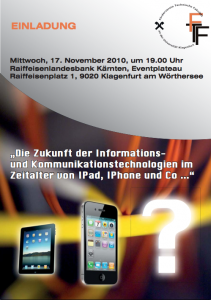 Einladung
Einladung
Mittwoch, 17. November 2010, um 19.00 Uhr Raiffeisenlandesbank Kärnten, Eventplateau Raiffeisenplatz 1, 9020 Klagenfurt am Wörthersee
Die Zukunft der Informations- und Kommunikationstechnologien im Zeitalter von iPad, iPhone, & Co …
Die Zukunft der Informationstechnologie wird von verschiedenen langanhaltenden Basistrends bestimmt, die zum Teil bereits seit mehreren Jahrzehnten mit erstaunlicher Konsistenz ihre Wirkung entfalten. Sie sorgen für eine immer größere Leistungsfähigkeit zu immer geringeren Kosten, was einerseits die zunehmende Allgegenwart der IKT realisiert und befördert, andererseits noch intelligentere Systeme ermöglicht, die sich den Gewohnheiten und Bedürfnisse des Nutzers anpassen.
In den letzten Jahren haben mobile Geräte wie iPhone, iPad & Co den IKT-Markt revolutioniert und wie kaum andere Technologien verändert. Der Förderverein der Technischen Fakultät an der Universität Klagenfurt, möchte aus diesem Grund diesen Trend und die zukünftige weitere Entwicklung der Informations und Kommuniksationstechnologie aus der Sicht der in Österreich führenden Anbieter beleuchten und deren Sichtweise zu diesem Thema der Öffentlichkeit vorstellen.
Folgende hochrangigige Firmenvertreter werden ihre Meinung zu diesem Thema näher bringen:
 |
 |
 |
| DI Leo Steiner, Generaldirektor der IBM Österreich |
DI Thomas Hintze, Vorsitzender der Geschäftsführung UPC Austria |
Mag. Jörg Bartussek, T-Mobile, Executive Director Strategie & Prozess Management |
Programm
- 19.00 Uhr: Einleitung und Begrüßung durchVorstandsdirektor Mag. Georg Messner Raiffeisenlandesbank Kärnten
- 19.05 Uhr: Die Zukunft der Informations- und Kommunikations-technologien im Zeitalter von iPad, iPhone & Co …
- 19.50 Uhr: Podiumsdiskussion unter der Leitung vom Dekan der Technischen Fakultät Prof. Martin Hitz
- Im Anschluß lassen wir den Abend bei Bier und Brezen gemütlich ausklingen
Moderation: Mag. Christian Inzko Obmann Förderverein der technischen Fakultät
Wir würden uns freuen, Sie bei dieser Veranstaltung persönlich begrüßen zu dürfen!
Ihre Anmeldung nehmen wir bis 16. November, unter der Telefon-Nummer: 0463/2700-3565 oder per E-Mail an klothilde.puschl@uni-klu.ac.at sehr gerne entgegen.
Einladung als PDF.
zp8497586rq




